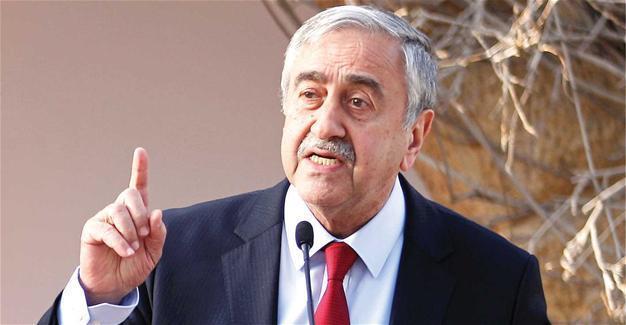Turkish Cypriot leader refuses to attend talks
NICOSIA

Turkish Cypriot President Mustafa Akıncı has refused to attend a scheduled leaders’ meeting on Feb. 23 on the grounds that Greek Cyprus has done nothing to repeal a recent law to permit schools to mark a vote to unify the island with Greece.
Turkish Cypriot presidential spokesperson Barış Burcu said on Feb. 22 that Akıncı would not attend the meeting with Greek Cypriot President Nicos Anastasiades under the auspices of U.N. special envoy Espen Barth Eide after Greek Cyprus failed to take the necessary measures to rescind the law to allow the celebration of a 1950 referendum in which Greek Cypriots voted to unite the island with Greece, which is known as “Enosis” in Greek, at schools.
Speaking at a joint press conference with Turkish Foreign Minister Mevlüt Çavuşoğlu on Feb. 21 in Nicosia, Akıncı presented two clauses to fix the stalled process.
He said Anastasiades needed to publicly announce that the “Enosis” decision was wrong, which Akıncı said Anastasiades had told him during the latest leaders’ meeting, in such a way that the Greek and Turkish Cypriot nations would hear this clearly, along with the rest of the world.
Akıncı said the second measure was for Anastasiades to rescind the law.
Burcu said Feb. 22 that Akıncı was ready to return to the negotiating table but that steps first needed to be taken to overturn the amendment.
“I hope that in the shortest time, the necessary steps will be taken and a new date [for the meeting] will be set,” the spokesman said.
“We expect concrete steps at a political and administrative level to reverse this mistaken decision... I hope that Anastasiades will make the necessary contributions to overcome this problem,” Burcu said.
Anastasiades expressed regret at the decision. “I regret the decision of Mr. Akıncı not to attend the meeting tomorrow. I am ready to continue the dialogue at any time,” he said on Twitter.
Eide had voiced confidence that this week’s meeting in Nicosia would go ahead regardless, but the climate of trust between the two leaders has deteriorated.
The head of the U.N. peacekeeping force on the island, Elizabeth Spehar, had shuttled between the two sides to try to broker a compromise, meeting Akıncı on Feb. 21 and Anastasiades on Feb. 22 but to no avail.
Recent peace talks on Feb. 16 “ended abruptly,” according to Eide, and the two leaders accused each other of storming out while slamming the door.
Anastasiades said it was a mistake to pass the legislation at a time when peace talks are at their most sensitive and because the drive for union with Greece is already celebrated as a public holiday on its April 1 anniversary.
But he lamented that the talks were being jeopardized by a “minor, insignificant issue.”
“It will be the first time in the history of the negotiations that the dialogue will be interrupted for a meaningless, minor incident,” the Greek Cypriot leader said Feb. 21.
Greek Cypriot political parties said in a joint statement that the legislation in no way reflected a shift away from the stated goal of a federated Cyprus.
Cyprus government spokesman Nicos Christodoulides said Akıncı was using the legislation as an excuse to deflect attention away from the real reasons why talks were not moving forward. Christodoulides said Turkey was stalling the process due to its demand to keep military intervention rights and troops on the island after reunification, The Associated Press reported.
Çavuşoğlu on Feb. 21 cited the “Enosis” law as justification to include troops and intervention rights in any peace deal as the law had revealed the Greek Cypriots’ “true intention.”
There was no immediate statement from the United Nations, which has been facilitating the talks.
 Turkish Cypriot President Mustafa Akıncı has refused to attend a scheduled leaders’ meeting on Feb. 23 on the grounds that Greek Cyprus has done nothing to repeal a recent law to permit schools to mark a vote to unify the island with Greece.
Turkish Cypriot President Mustafa Akıncı has refused to attend a scheduled leaders’ meeting on Feb. 23 on the grounds that Greek Cyprus has done nothing to repeal a recent law to permit schools to mark a vote to unify the island with Greece.